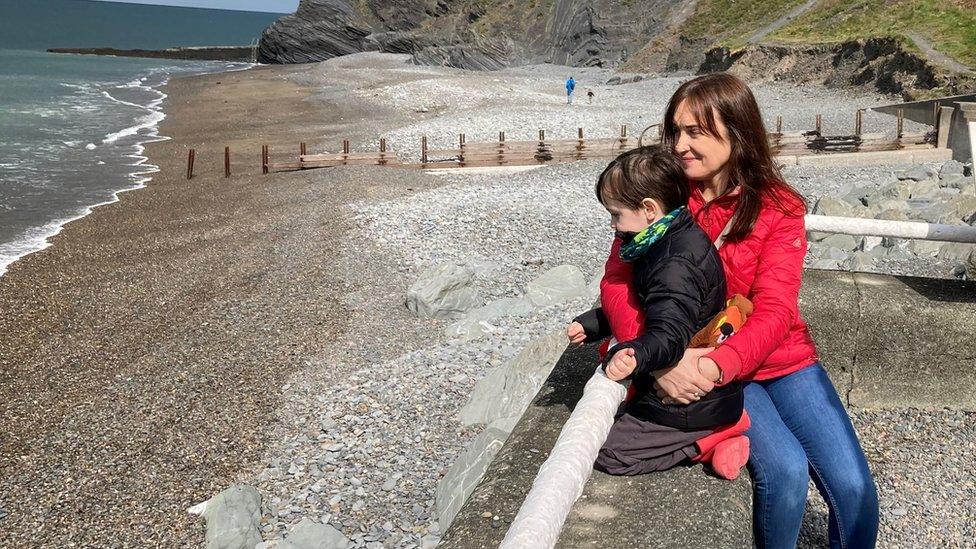Welsh language: 'Boring' poems put students off study
- Published

Plans for more Welsh spoken in schools are part of the push for one million Welsh speakers by 2050
"Boring" poems and books used for GCSE Welsh are putting students off studying the subject at A-level and university, it has been claimed.
Students want to see a more modern take being used as universities have seen numbers halve in the past 10 years.
One warned the "worrying picture" could see Welsh departments come under threat in the future if nothing is done to improve the situation.
The Welsh government said Welsh skills are vital to the future workforce.
'More women needed'
First-year Welsh student Tesni Peers, who studies at Bangor University, said there were parts of the school course she would change.
"There are a lot of novels now like 'Llyfr Glas Nebo' and Tu ôl i'r Awyr, they would be ideal to study because they are modern and they are challenging at the same time," she said.
"Un Nos Ola Leuad was fab and I don't regret reading that at all and I enjoyed some of the poems [in the GCSE course], but there were others I thought 'this is boring'.
"Also, only a handful of women are included, when there are a large number of other poems that should be studied at school."
Some A-level Welsh students at Ysgol Bro Hyddgen in Machynlleth, would also like to see change.

Welsh students Mari, Branwen, Non and Lois have mixed views on how the language should be taught in the future
"I think it will be interesting to modernise the Welsh course but it will be important for people in the coming years to learn about [literature] in medieval times," said Cerys.
Non also thought modernisation was needed.
"I think more contemporary novels need to be introduced, but I really enjoyed studying Caradog Prichard's Un Noson Ola Leuad," she said.
But Branwen said: "We do the Hengerdd and the Cywyddau, and I enjoy them because we also learn about history."
Gwynedd Parry, head of Swansea University's Welsh department, said the course would usually attract about 20 students per year but that has dropped over the years.
"Of course, it varies from year to year but generally speaking, we're talking about halving," he said.
"It's a significant drop, so it's a worrying picture."
There is a similar pattern at other Welsh departments across universities in Wales.
At Bangor University, 19 students started an undergraduate Welsh degree course in 2011, while that figure has dropped to 10 students for this year.
Cardiff University has seen numbers fall from 50 to 30 over the same period and Aberystwyth is down to 23 from 48.
However, Welsh departments said steps have been taken over the years to adapt the course to attract more students.
And from September, Bangor University give new students the chance to study "a large chunk" of the BA and MA (Welsh and professional Welsh) courses online.
Part of the battle universities face is losing prospective students before they consider what degrees to take.
There were 304 pupils studying A-level Welsh in 2008 and 2009 but by 2020, that number had dropped to 231.
Over the same period those choosing Welsh second language for A-levels has dropped from 489 to 195.
Pushing students 'over the border'
Mr Parry said parts of the GCSE course need to be revisited, but he believes there are other reasons behind the decline.
"There are messages that to some extent push young people to study science subjects. There are messages that motivate them to study across the border," he said.
He said Wales needs Welsh language and literature graduates to support the Welsh government's target of reaching a million Welsh speakers by 2050.
"If you are serious about that, you have to have graduates in Welsh to feed the teaching profession, the translation profession and many other sectors within our society," he added.
The Welsh government said it had provided £125,000 a year to Coleg Cymraeg Cenedlaethol over the past three years to work with schools, colleges and universities to fund activities aimed at reversing the decline in A-level Welsh.
A spokesman added: "Welsh skills are vital to the workforce of the future, especially in areas such as teaching."
The Welsh Joint Education Committee (WJEC) exam board said there are some changes already being planned for the Welsh GCSE course.
"WJEC designs and delivers qualifications and assessments in accordance with Qualifications Wales' requirements, and as an awarding organisation, we do not promote any one subject over another," a spokesman said.
"To support Wales' new curriculum, Qualifications Wales has recently launched its 'Qualified for the Future' initiative, which includes a new generation of GCSEs, including Welsh Language qualifications, that will be taught from September 2025."

THE STORY OF MIWSIG: Eleri Price and Huw Stephens time travel with Welsh language pop
MARGINS TO MAINSTREAM: Michael Sheen introduces new writers revealing their truths

- Published13 July 2021

- Published9 April 2022

- Published17 December 2020

- Published2 January 2020
